The Call
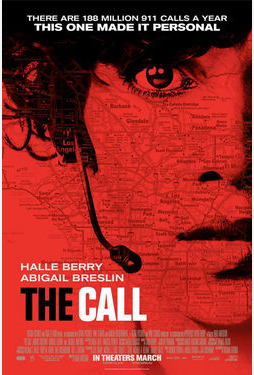
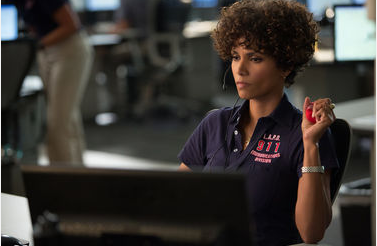 What was screenwriter Richard D'Ovido thinking when he came up with that last scene? Why did he choose to end this story in such a way that we hate everyone who has played a major role in the film? I have seen many a film that has been brought down by a disappointing climax or ending, but I cannot remember hating an ending more than this. It cheapens and goes against everything the movie has been building up to. Not only that, it leaves us on a sour note, where we end up despising the main characters who, up until that point, have been decent people. Did the filmmakers really think that this was the right way to end their story? Did they stop and think what message they were sending to the audience, and how it goes against everything that came before it in the movie? I'm trying to think of answers to rationalize the decisions the movie comes to, and I come up blank.
What was screenwriter Richard D'Ovido thinking when he came up with that last scene? Why did he choose to end this story in such a way that we hate everyone who has played a major role in the film? I have seen many a film that has been brought down by a disappointing climax or ending, but I cannot remember hating an ending more than this. It cheapens and goes against everything the movie has been building up to. Not only that, it leaves us on a sour note, where we end up despising the main characters who, up until that point, have been decent people. Did the filmmakers really think that this was the right way to end their story? Did they stop and think what message they were sending to the audience, and how it goes against everything that came before it in the movie? I'm trying to think of answers to rationalize the decisions the movie comes to, and I come up blank.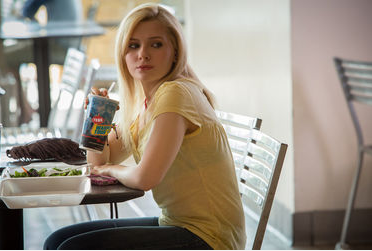 But long before the movie flies off the rails into morally questionable territory, it's an effective thriller. Halle Berry plays Jordan, a 911 operator who, early in the film, answers the call of a frightened teenage girl (Evie Thompson) whose house is being invaded by an intruder when she's home alone. The girl goes into hiding, and as she does so, she accidentally drops the call. Jordan makes the mistake of calling the number back, which alerts the intruder to the girl's presence when the phone starts ringing. Jordan is forced to listen to the girl's abduction over the phone, and days later, the teenager's body is discovered in a field on the side of a road. Jordan blames herself for the girl's murder, and leaves her position as an operator, opting instead to train new operators for the challenges they will face on the job as they deal with these emergencies.
But long before the movie flies off the rails into morally questionable territory, it's an effective thriller. Halle Berry plays Jordan, a 911 operator who, early in the film, answers the call of a frightened teenage girl (Evie Thompson) whose house is being invaded by an intruder when she's home alone. The girl goes into hiding, and as she does so, she accidentally drops the call. Jordan makes the mistake of calling the number back, which alerts the intruder to the girl's presence when the phone starts ringing. Jordan is forced to listen to the girl's abduction over the phone, and days later, the teenager's body is discovered in a field on the side of a road. Jordan blames herself for the girl's murder, and leaves her position as an operator, opting instead to train new operators for the challenges they will face on the job as they deal with these emergencies.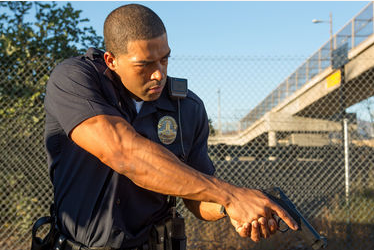 Jordan is called back into action when it appears that the same abductor from that night has taken another teenage girl hostage. This time, he kidnaps young Casey Welson (Abigail Breslin) from a mall parking garage, and throws her into the trunk of his car. Casey is able to call 911 from her cell phone, and the bulk of the film deals with Jordan trying to talk Casey through her situation, and how to get the attention of other drivers on the road, such as kicking out the car's taillight, and waving her hand, so people will know someone is in the trunk. It turns into a race against time as Jordan and her fellow operators try to track down the car, and just where Casey is being taken to. This is where I was completely behind the film. The pace is tense and relentless, and both Jordan and Casey are written as semi-intelligent women. I especially liked that Casey was not written as a total victim, and does make an effort to fight back.
Jordan is called back into action when it appears that the same abductor from that night has taken another teenage girl hostage. This time, he kidnaps young Casey Welson (Abigail Breslin) from a mall parking garage, and throws her into the trunk of his car. Casey is able to call 911 from her cell phone, and the bulk of the film deals with Jordan trying to talk Casey through her situation, and how to get the attention of other drivers on the road, such as kicking out the car's taillight, and waving her hand, so people will know someone is in the trunk. It turns into a race against time as Jordan and her fellow operators try to track down the car, and just where Casey is being taken to. This is where I was completely behind the film. The pace is tense and relentless, and both Jordan and Casey are written as semi-intelligent women. I especially liked that Casey was not written as a total victim, and does make an effort to fight back.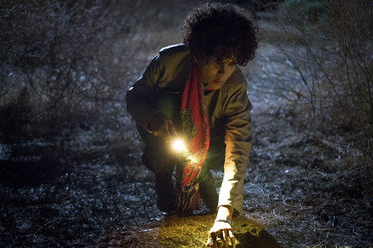 The police eventually learn the identity of the kidnapper, and follow the clues which lead them to a house in the suburbs. Turns out he's a family man leading a double life, with a wife and kids who have no idea of what he's been doing. Their leads go nowhere, however, and soon it seems as if Casey will become another victim of this psychopath. That's when Jordan decides to take the law into her own hands, and the movie starts to break down. Its downfall is gradual at first, but it picks up steam when Jordan starts doing her own investigating, and learns that the madman has dragged Casey into a secret underground torture lair out in the middle of nowhere. We get a lot of grisly, bloody images, and a lot of shots of the kidnapper frothing and overacting. It's the kind of stuff we've seen in a dozen Mad Slasher movies just like it, and it makes no successful argument as to why we're sitting through it again.
The police eventually learn the identity of the kidnapper, and follow the clues which lead them to a house in the suburbs. Turns out he's a family man leading a double life, with a wife and kids who have no idea of what he's been doing. Their leads go nowhere, however, and soon it seems as if Casey will become another victim of this psychopath. That's when Jordan decides to take the law into her own hands, and the movie starts to break down. Its downfall is gradual at first, but it picks up steam when Jordan starts doing her own investigating, and learns that the madman has dragged Casey into a secret underground torture lair out in the middle of nowhere. We get a lot of grisly, bloody images, and a lot of shots of the kidnapper frothing and overacting. It's the kind of stuff we've seen in a dozen Mad Slasher movies just like it, and it makes no successful argument as to why we're sitting through it again.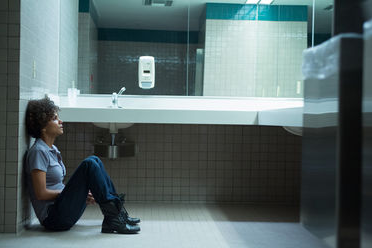 At this point, The Call has downgraded from a fairly tight and suspenseful thriller, to a stupid slasher film. Disappointing, yes, but still livable. I thought this was going to be the biggest offense the movie was going to pull on its audience, and I was willing to be kind. I guess nothing could prepare me for what would happen next. You have no idea how much I long to spoil what happens next in the hopes that it will keep some people away from this movie. Heck, by building it up and tiptoeing around it, I'm probably just building interest in you, the reader. I sincerely hope not. Don't let morbid curiosity suck you in. If you want to know how it ends, check the film's message board over on the IMDB. They love to spoil movies over there. All I will say about the ending is that it somehow manages to be manipulative, wrong-headed, repulsive, morally questionable, and creatively bankrupt all at the same time.
At this point, The Call has downgraded from a fairly tight and suspenseful thriller, to a stupid slasher film. Disappointing, yes, but still livable. I thought this was going to be the biggest offense the movie was going to pull on its audience, and I was willing to be kind. I guess nothing could prepare me for what would happen next. You have no idea how much I long to spoil what happens next in the hopes that it will keep some people away from this movie. Heck, by building it up and tiptoeing around it, I'm probably just building interest in you, the reader. I sincerely hope not. Don't let morbid curiosity suck you in. If you want to know how it ends, check the film's message board over on the IMDB. They love to spoil movies over there. All I will say about the ending is that it somehow manages to be manipulative, wrong-headed, repulsive, morally questionable, and creatively bankrupt all at the same time.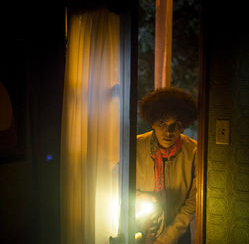 I think the reason why the ending struck me in such a horrible way is up until that point, Jordan and Casey are portrayed as likable and semi-intelligent people. Both Halle Berry and Abigail Breslin give strong performances. Berry, in particular, is good at portraying her sympathetic and haunted character, and is believable as someone who is cool under the pressure of her job. In fact, the movie itself does a really good job of creating a 911 call center, and the pressures the job entails. As for Breslin, she has the more difficult task of having to be crammed in a claustrophobic space for much of her screen time. She is emotional and strong, and has come a long way from the little girl in Little Miss Sunshine. I liked both of these actresses and their performances, and the film's ending seems to go out of its way to betray that.
I think the reason why the ending struck me in such a horrible way is up until that point, Jordan and Casey are portrayed as likable and semi-intelligent people. Both Halle Berry and Abigail Breslin give strong performances. Berry, in particular, is good at portraying her sympathetic and haunted character, and is believable as someone who is cool under the pressure of her job. In fact, the movie itself does a really good job of creating a 911 call center, and the pressures the job entails. As for Breslin, she has the more difficult task of having to be crammed in a claustrophobic space for much of her screen time. She is emotional and strong, and has come a long way from the little girl in Little Miss Sunshine. I liked both of these actresses and their performances, and the film's ending seems to go out of its way to betray that.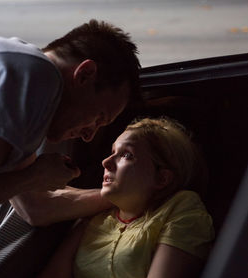
See the movie times in your area or buy the DVD at Amazon.com!






0 Comments:
Post a Comment
<< Home